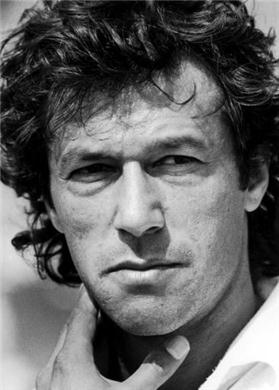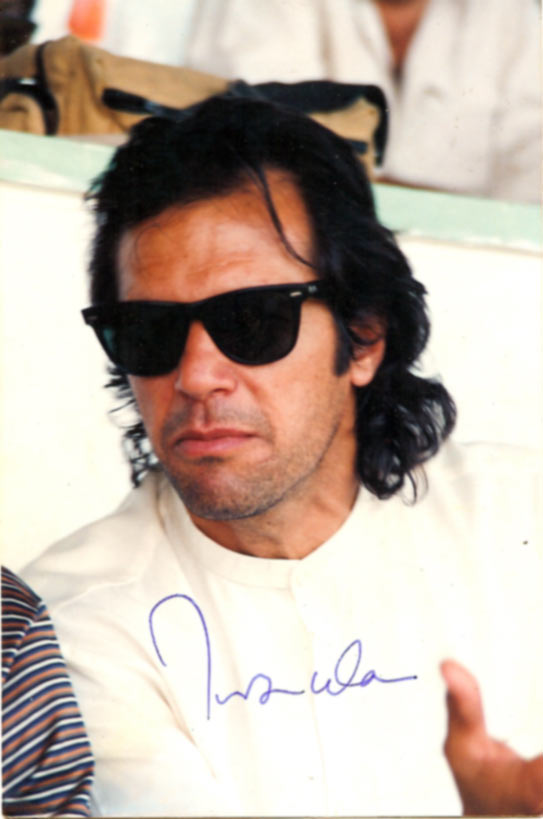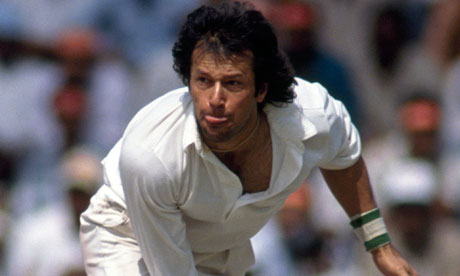Imran Khan
Source Link: google.com.pk
Biography
Imran Khan Niazi, the only boy and seventh member of his family was born on November 25, 1952 to a Pashtun family in Lahore, Pakistan. He attended Aitchison College in Lahore and later moved to Oxford for higher studies.Hailing from a great cricketing family - his cousins; Javed Burki and Majid Khan both preceded him in going to Oxford and captaining Pakistan. Khan married Jemima Goldsmith, an English socialite, who converted to Islam on May 16, 1995 in Paris. A marriage described as ‘tough’ ended in a divorce after eight years in June 2004 as Jemima Khan was allegedly unable to adapt to Pakistani culture.
As a Cricketer: Following the footsteps of his cousins, Khan started playing cricket since the age of 13. Initially playing for his college and later representing English county Worcester, he made his debut for Pakistan at the age of 18 during the 1971 English series at Birmingham. Soon, he had acquired a permanent place in the team for himself.
As a genuine all-rounder, Khan consistently made useful contributions in all forms of cricket with tremendous hard-hitting and swing abilities. Khan achieved the all-rounder’s triple in 75 tests and was known to make the second fastest record after Ian Botham of England cricket team.
His career came to an end after the first and only ODI World Cup victory for Pakistan in 1992 with a record of 3,807 runs and 362 wickets in Test cricket.
As a Social Worker: Imran Khan focused more on social work and community development after retiring from international cricket. He founded Shaukat Khanum Memorial Trust in 1991, which actively worked on the research and development of cancer and other related diseases. This was instigated by his mother’s untimely death, who died of cancer.
Khan vowed to address this major issue and was convinced to open an appropriate cancer facility catering to all social segments of the country.
On December 29, 1994, Shaukat Khanum Cancer Hospital was officially integrated in Lahore, Pakistan. It remains the largest cancer hospital in the country serving the underprivileged stratum of the society. The poor people of the country are treated free of charge and are constantly kept a check on for future reference.
Imran Khan is also planning to open a similar facility in Karachi.
As a Politician: After turning his dream project into reality and interacting with the poorest sections of the society, Imran Khan decided that there was a need of change, a revolution which was only possible through politics. He wanted to serve the people who gave him such respect and honour.
In 1997, he initiated his own political party ‘Pakistan Tehreek-e-Insaf (Movement for Justice) to focus on justice for the common through an independent judiciary, accountability of the elite and promotion of democracy. His penchant to eradicate corruption from the country remained the utmost priority on his political mandate. Khan contested for a National Assembly seat in October 2002 elections and served as a Member Parliament from NA- 71, Mianwali until 2007. With steady developments in the ring, PTI continues to grow under the leadership of Imran Khan.
Recently, PTI has gained popularity amongst the youth of the nation. Students and young professionals belonging to all domains flock behind Imran Khan. His rallies against corruption and misdemeanours of various important political figures have brought about this revolutionary change.
He also claims that international aid remains a threat to Pakistan’s sovereignty. According to Khan, aid only feeds the government and is of little help to the needy citizens. Policies and reforms are what the country needs immediately.














No comments:
Post a Comment